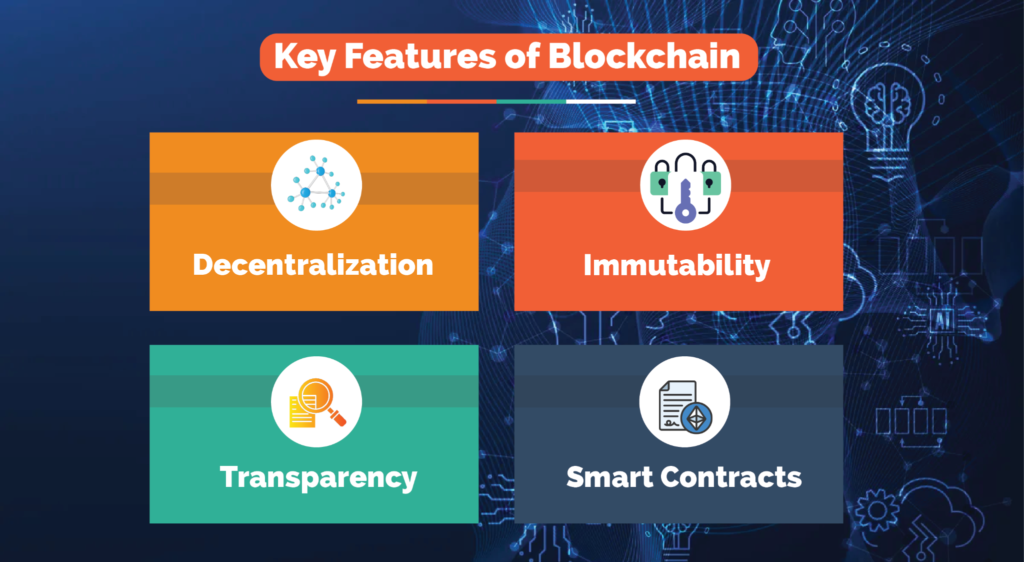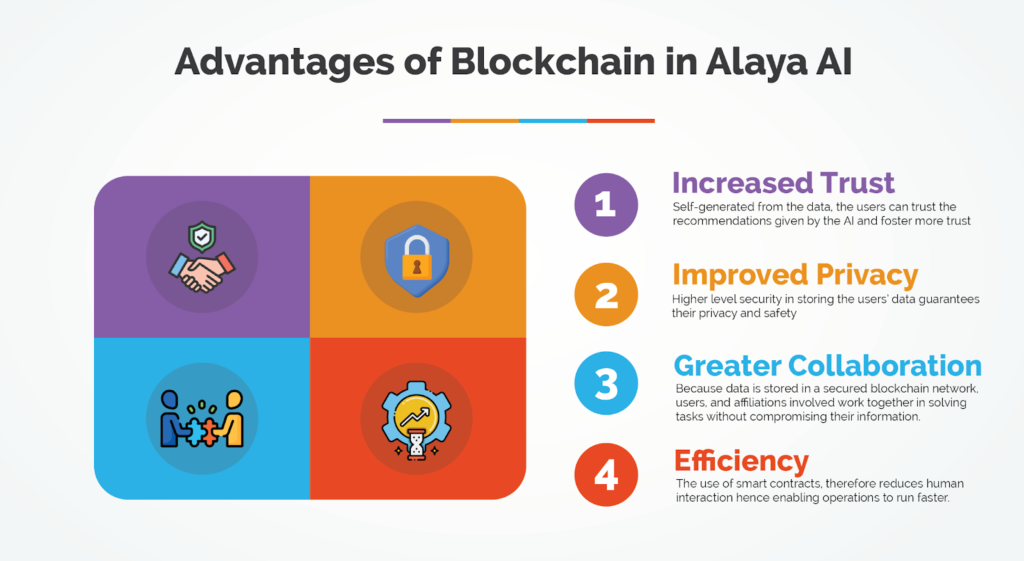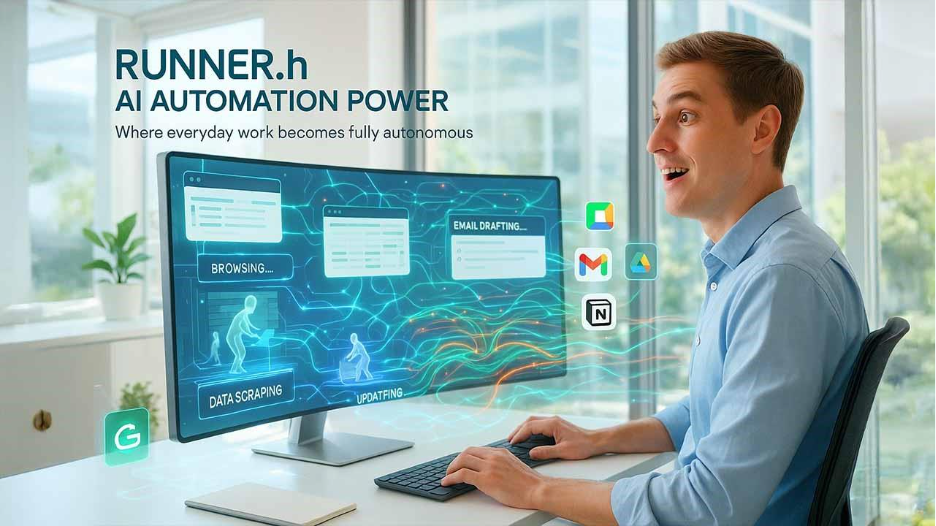When it comes to changes in technology, the integration of blockchain with artificial intelligence turns into a powerhouse. This potent combination is used by Alaya AI, a first-of-its-kind platform, to improve the approaches to data control, privacy, and protection. This blog reviews the basics of blockchain technology in Alaya AI and also explains how they are incorporated into the framework.
Understanding Blockchain Technology
Blockchain is an open distributed ledger that stores information on multiple computers securely and transparently. The system keeps an electronic record of time stamp, and every record has no edit option once entered into a system. This characteristic makes blockchain the best solution in aspects of security, openness, and audibility of data.
Key Features of Blockchain

1. Decentralization:
This is in contrast to what is seen in conventional databases, where data is stored in a centralized manner and is prone to single-point vulnerabilities.
2. Immutability:
The essence of blockchain technology in Alaya AI is that once the data is fed into the block, it cannot be changed again without the consensus of other participants in the network, thus making it difficult to change the data fed into a block.
3. Transparency:
Every transaction is replicated on the system and is open to the public, thus creating the ability to check and audit the transactions.
4. Smart Contracts:
Smart contracts are automated contracts that contain particular provisions that execute the contract without the use of middlemen.
What is Alaya AI?
Alaya AI is a smart platform that uses artificial intelligence to enhance data processing and network calculation models as well as decision-making. Through blockchain incorporation, Alaya AI avails itself of a significant boost in efficiency, bringing tremendous value to its users and enabling businesses to refine their business plans for the future of AI-driven innovation.
How is blockchain integrated into Alaya AI?
The integration of blockchain technology in Alaya AI can be viewed through several key applications:
1. Data Integrity and Trust
Blockchain is used as the underlying system with which data needed by Alaya AI is stored. Because data interactions are stored in a decentralized ledger, Alaya AI guarantees the users the accuracy and source of the information. This level of trust is critical, especially when the AI algorithms make decisions based on an analysis of the data.
2. Enhanced Data Security
As the issues regarding data breaches and cyber threats escalate, solving this issue can greatly enhance Alaya AI’s data security by incorporating blockchain. Blockchain organization lacks a central data storage system, making it less vulnerable to cyber menace than other systems.
3. Controlled Data Sharing
Alaya AI uses blockchain to change the conventional ways of data management and sharing. Data is owned and managed by the users, who have full authority over who has access to the data, and in what manner. Thus, even if Alaya AI works with loads of various data, the clients’ privacy is still as inviolable as it can be.
4. Smart Contracts:
A New Concept in Computers for Automated Transactions. In Alaya AI, smart contracts enable an organization to automate different occurrences to reduce the number of interfaces required at the workplace. For example, when people accept the sharing of personal data, smart contracts can perform the required arrangement without interference while enforcing compliance with the laid down agreements.
5. Interoperability across Systems
The case of Blockchain is that it helps Alaya AI link disparate systems or connections to improve the business’s functioning. This means that when multiple designs are incorporated as a single solution where they interact, the various models of operation will be much more powerful in terms of analytic and predictive capability.
Advantages of Blockchain in Alaya AI

The integration of blockchain technology in Alaya AI offers numerous benefits:
- Increased Trust: Self-generated from the data, the users can trust the recommendations given by the AI and foster more trust.
- Improved Privacy: Higher level security in storing the users’ data guarantees their privacy and safety
- Greater Collaboration: Because data is stored in a secured blockchain network, users, and affiliations involved work together in solving tasks without compromising their information.
- Efficiency: The use of smart contracts, therefore reduces human interaction, hence enabling operations to run faster
Conclusion
Blockchain technology in Alaya AI is a groundbreaking example that improves the quality and speed of data processing and data security. As this integration develops, the possibilities are virtually limitless across such sectors as finance, education, health care, and others, giving enormous added value to consumers. Thus, understanding these advances facilitates business entities and individuals to maximize on the potential of blockchain and AI.
On one hand, technology buffs and gearheads; on the other hand, the corporate world decision-makers striving to adopt innovative technologies forward, knowing the interrelation of the blockchain and Alaya AI is critical to grasping the scene where digital transformation is heading.
Blockchain technology in Alaya AI-FAQs
1. What part do blockchains play in AI?
Blockchain offers a mechanism to ensure the integrity of data that forms the basis of AI applications and an environment that is secure, transparent, and does not allow forgery. This improves the credibility of the models that AI develops.
2. How can blockchain improve data privacy in Alaya AI?
Blockchain allows users to maintain control over their data through encrypted and permissioned access. Users decide when and how their data is shared, ensuring privacy is respected.
3. What challenges exist in integrating blockchain with AI?
Integrating these technologies can be complex, requiring substantial technical expertise. Other challenges include scalability issues, managing transaction speeds, and ensuring interoperability across different systems.
4. Is blockchain technology in Alaya AI scalable?
Yes, blockchain architecture can be designed for scalability. Techniques can be implemented to enhance throughput and accommodate larger datasets, although ongoing developments in blockchain are crucial to facilitate this scalability.
5. How do users benefit from smart contracts in Alaya AI?
Smart contracts automate agreements and processes, ensuring that terms are automatically enforced. This reduces the need for intermediaries, saves time, and minimizes costs.
6. What is the future of blockchain-integrated AI solutions?
The future of this combination seems promising, with ongoing advancements aimed at enhancing efficiency, privacy, and usability. As more industries adopt these technologies, we can anticipate innovative applications that will reshape traditional workflows.








